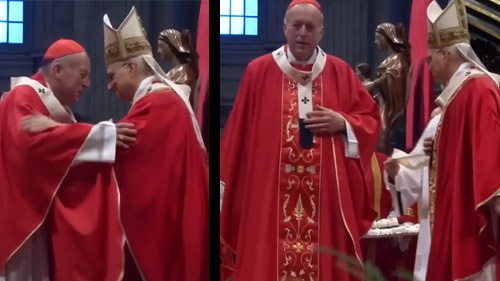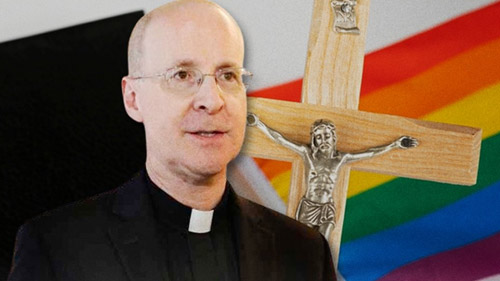| Recent Featured Videos and Articles | Eastern “Orthodoxy” Refuted | How To Avoid Sin | The Antichrist Identified! | What Fake Christians Get Wrong About Ephesians | Why So Many Can't Believe | “Magicians” Prove A Spiritual World Exists | Amazing Evidence For God | News Links |
| Vatican II “Catholic” Church Exposed | Steps To Convert | Outside The Church There Is No Salvation | E-Exchanges | The Holy Rosary | Padre Pio | Traditional Catholic Issues And Groups | Help Save Souls: Donate |  |









 " />
" /> " />
" /> " />
" /> " />
" /> " />
" />




Pius XII And Heresy - Was He A Heretic?
His entire line of argumentation is a straw man – that is, attributing to another a position he doesn’t actually hold. We don’t believe that someone who is a heretic in his fallible capacity remains the pope. We don’t say that. Since they cannot refute the position, they must use straw-man argumentation. No heretic can remain the pope, even if he only teaches the heresy in his fallible capacity. (A true pope could never teach heresy in an infallible capacity, of course.)
The point is that there isn’t sufficient evidence to definitely conclude that Pius XII was a heretic, rather than someone who was a terribly weak pope who made doctrinal errors. That’s because the errors which Pius XII taught were not specific propositions which have been explicitly condemned by the Magisterium by name. Rather, they are proven to be false and incompatible with Catholic teaching by the positive dogmatic statements on related subjects. As a result, these errors become heresies once one puts together (or can be shown to be directly obstinate against) all of the positive dogmatic evidence which contradicts them. That doesn’t mean that someone doesn’t sin for promoting them and neglecting to more carefully consult Catholic teaching. It is simply to point out that there is a difference, from the standpoint of manifest heresy, between the promotion of such an error and the promotion of something that has been explicitly and notoriously condemned by name in a dogmatic decree (e.g., Justification by faith alone).
In fact, notice that in the following decree of the Council of Constance, there is a distinction between propositions that are offensive to Catholic teaching, etc. and those which are notoriously heretical. They are “notoriously heretical” because they have previously been condemned by the Magisterium by name, in a manner which should be obvious to all. This proves that notoriety is not simply reserved for how one promotes a falsehood, but also THE SPECIFIC FALSEHOOD ITSELF (i.e., how clearly and obviously has it been condemned by the Church). This coincides precisely with what we’ve said about certain undeclared heretical priests. We’ve pointed out (correctly) that how notorious they are is not only dependent upon how they promote something, but also dependent upon the content of the falsehood they embrace.
MORE ON PIUS XII AND HERESY
Hello Dimond Brothers,
I just had some questions regarding the recent post you made about "Pius XII and heresy": You say that "there isn’t sufficient evidence to definitely conclude that Pius XII was a heretic" when you yourself say in your book (Outside the Catholic Church there is absolutely no salvation) the following:
"Pius XII was by no means a staunch traditionalist. His reforms, omissions and failures paved the way for Vatican II. Just a few things that Pius XII did are:
- He promoted Annibale Bugnini, the author of the New Mass, and began the liturgical reform with his allowance of reforms in the Holy Week Rites. A good number of liturgical scholars think that the reforms of Holy Week were terrible. One example is the allowance of distribution of Holy Communion on Good Friday. The decree of the Holy Office under Pope Pius X On Frequent Communion cites Pope Innocent XI who condemned such a practice.
- He promoted men like Giovanni Montini (later Paul VI) and Angelo Roncalli (later John XXIII), without which promotions these men could never have had the influence or caused the immeasurable destruction that they did. - He said that theistic evolution could be taught in Catholic schools (Humani Generis, 1950), which is nothing short of ludicrous – and arguably heretical.
- He taught that birth control could be used by couples by means of the rhythm method (or Natural Family Planning), which is a frustration and a subordination of the primary purpose of the marriage act – conception.
- He allowed the persecution and subsequent excommunication of Father Leonard Feeney, whether through willful complicity or neglect, for doing what every Catholic priest should do: preach the Gospel, defend the faith and adhere to defined dogma."
Now, if all of these things that you listed are not "sufficient evidence to conclude that Pius XII was a heretic", a man that you claim "paved the way for Vatican II", then what is? I even heard from someone that he was a Mason, along with Benedict XV (15) and Pius XI (haven't confirmed it yet). He also said in a speech that adults can be saved without the Sacrament of Baptism. Now to the real problems:
- It is a solemnly defined dogma that the Sacrament of Baptism is absolutely necessary for salvation, without exceptions, (Council of Trent, Florence, etc.) as you very well know - Pius XII said that adults can be saved without it - Heresy.
- You hold that NFP is infallibly condemned in Pius XI's infallible Encyclical Casti Connubbi - Pius XII explicitly taught NFP - Heresy. - He said that theistic evolution could be taught in Catholic schools, and also was on both sides regarding evolution - something you yourself say is heretical. Now, you then say "the errors which Pius XII taught were not specific propositions which have been explicitly condemned by the Magisterium by name. Rather, they are proven to be false and incompatible with Catholic teaching by the positive dogmatic statements on related subjects."
This is clearly false, and a specious lie. As mentioned above: - That the Sacrament of Baptism is necessary for salvation without exceptions, and that the ones who die without it can go to Heaven, the former has been dogmatically defined many times, and the latter has been dogmatically condemned by name as well - Pius XII taught that adults can be saved without the Sacrament of Baptism, which is heretical.
- You say that NFP was infallibly condemned in name by Pope Pius XI - Pius XII taught it, which is heretical. And you can't argue that Pius XII was "unfamiliar" or "unaware" of all these teachings, that's absurd, because Pius XII was a cleric: "If the delinquent making this claim be a cleric, his plea for mitigation must be dismissed, either as untrue, or else as indicating ignorance which is affected, or at least crass and supine…His ecclesiastical training in the seminary, with its moral and dogmatic theology, its ecclesiastical history, not to mention its canon law, all insure that the Church’s attitude towards heresy was imparted to him." (McDevitt, 48.)
And, seriously, are you really going to argue that, that adults can't be saved without the Sacrament of Baptism, "evolution", and NFP, have not been notoriously condemned??? I'm afraid you're again (you have done this before) guilty of raising the bar as to what constitues a heresy, what is heretical and when does a Pope lose his office, you do this when you don't want to accept the outcome. You gotta be honest here, something you yourself recommend. There was also another point I wanted to make: Pope Honorius I was condemned as a heretic for "supposedly" having held/supported the monophysite heresy; I have read that they weren't even sure if he was a heretic 100% or not (St. Francis de Sales certainly wasn't sure), or if he even held the heresy.
Now, if they condemned him for apparently having been a heretic, what would they say about Pius XII, who taught explicit and open heresy (among all the other things he did/didn't do)???
The way I see it, the same reasons why you would consider John XXIII as an antipope, you would also consider Pius XII, and perhaps Benedict XV (15) as well. But with all that said, I myself haven't decided to believe if Pius XII or Benedict XV (15) really were antipopes, but the evidence sure seems to suggest they were. How do you reply?
There are numerous errors in your very dishonest, illogical and inaccurate e-mail. Since people such as yourself have already been refuted in audios, etc., I’m not going to spend a lot of time with you. I will quickly refute your main errors, however. To your first lie:
>>>>"[quoting us] the errors which Pius XII taught were not specific propositions which have been explicitly condemned by the Magisterium by name. Rather, they are proven to be false and incompatible with Catholic teaching by the positive dogmatic statements on related subjects." [You write] This is clearly false, and a specious lie. >>>
No, it's not a lie. You are the heretical and contradictory liar, as I will show. We are talking here about the idea of explicit baptism of desire. The theory of explicit baptism of desire is a horrible error. We have pointed this out more than anyone. This horrible error becomes a heresy once one sees all of the positive dogmatic evidence which contradicts it. However, this idea (i.e., explicit baptism of desire) hasn’t been condemned by name. Someone could be confused about the issue or hold it in good faith until all of the dogmatic evidence is pointed out to him and the objections raised in its favor are refuted. To obstinately express belief in it after that time is to demonstrate bad will and to depart from the faith. Therefore, explicit baptism of desire is proven to be incompatible with Catholic teaching by the positive evidence. For you to say that it has been explicitly condemned by name is dishonest. So, what we’ve already written refutes you.
Moreover, you condemn yourself in your own e-mail. That’s because if you really believe what you write, you would have to say that Pius XII was definitely a heretic and therefore an antipope. Instead, you say that you don't know if he was a heretic:
You write<<<<But with all that said, I myself haven't decided to believe if Pius XII or Benedict XV (15) really were antipopes>>>
You are condemned by your own words. Your whole e-mail purports to show that he was a heretic. You thus prove yourself to be a contradictory liar. You aren’t even convinced that he was a heretic! That means that you don't really believe what you write. Get out of here, you phony. Don’t act like you believe something that you don’t. Moreover, if anyone who affirms explicit baptism of desire even once is ipso facto to be considered a heretic, then that means you would have to say that St. Alphonsus and St. Robert were heretics. There is no way around that argument. They believed in explicit baptism of desire. They were dead wrong, of course; and to obstinately hold their erroneous position in the face of all the dogmatic evidence does show bad will. However, it is not ipso facto a proof of manifest heresy. If you don't admit that they and everyone who expresses belief in it even once is to be considered a heretic, then you condemn yourself again. If you do, then you further prove yourself to be a non-Catholic; for in that case you must condemn the Catholic Church itself for canonizing those you deem to have been manifest heretics. By the way, have some courage and put your real full name.
To your next lie, you write:
>>>You say that NFP was infallibly condemned in name by Pope Pius XI - Pius XII taught it, which is heretical.>>>
We don’t say that Pius XI infallibly condemned it “in name.” He did not. We say that it’s proven to be incompatible with the infallible Catholic teaching on the primary purpose of the marriage act. Thus, you dishonestly misrepresent what we say. Please quote the passage where NFP is explicitly condemned by name. You cannot do so because it doesn’t exist. Rather, it’s proven to be wrong by the positive evidence, just as we said.
Regarding Pius XII and theistic evolution, we agree that it’s horrible, awful, atrocious. There are only two things which we believe save him from manifest heresy on this point (though not from mortal sin and grave error). Those are 1) the fact that it hasn’t been explicitly condemned in any dogmatic decree. It’s definitely false and certainly runs counter to the obvious teaching of Scripture and the whole history of Catholic thought. However, it is not proven to be heretical by virtue of a specific condemnation by a dogmatic decree. That holds significance for point #2.
2) The fact that Pius XII didn’t say that he believed in it. He said that it may be taught. Thus, one could arguably justify him from manifest heresy (though not from mortal sin and scandal) by arguing that, even though he personally didn’t believe in it, he labored under the false impression that he couldn’t forbid people to teach it if it hasn’t been condemned in a dogmatic decree. That’s the only thing that we believe saves him from manifest heresy on this point. In fact, if you read what he said about it, you can see in that very context that he forbids people from teaching only those things which he believes to have been clearly condemned by the teaching of dogmatic councils or by a specific statement of the papal magisterium.
To your next statement, which truly expresses your schismatic mentality, you write:
>>>I even heard from someone that he was a Mason, along with Benedict XV (15) and Pius XI (haven't confirmed it yet).>>>
We’ve heard many unflattering things about Pope Pius XII. But hearing things, and having clear proof for them, are two different things. Hearing things about someone doesn’t allow us to conclude that a true pope is an antipope. The fact that you argue that it does reveals that you have a schismatic – not a Catholic – way of operating. You also ask: what would he have to do? I could give many examples. If he clearly taught (more than once, so that we know it wasn’t an editorial error) that souls can be saved in non-Catholic religions, he would have to be considered a manifest heretic. But not only is that not the case, his official teaching in Mystici Corporis contradicts that heresy. It also contradicts any notion of salvation without the Sacrament of Baptism. One can effectively use it to disprove the baptism of desire crowd of apostates.
With regard to Pius XII paving the way for Vatican II, that also doesn’t prove that he was without question a heretic. In his fallible capacity, a bad pope can attempt to hurt the Church. He can do this by omissions, bad reforms, and weak statements which don’t rise to the level of manifest heresy. That’s precisely why St. Robert Bellarmine speaks of a true pope who tries to destroy the Church. We quote this passage not because in itself it proves the true position; but rather because it lends further support to the correct Catholic understanding of this issue, which I have been articulating. Bellarmine is talking about a bad pope. He says that you may resist such a pope. In other words, there could be a true pope who tries to destroy the Church. He could do this in ways that don’t rise to the level of clear-cut manifest heresy.
But when speaking of a clear-cut manifest heretic, St. Robert clearly says that such a one ceases to be the pope.
As an aside, countless false traditionalists cite the former passage but dishonestly do not cite the latter.
To your final error, you don’t understand the Honorius case. The councils which condemned him (e.g., Constantinople III) didn’t express any uncertainty. They didn’t condemn him because they believed he was “apparently” a heretic. Rather, they condemned him as an outright heretic because they believed he was an outright heretic. The confusion arose after the council – not within the actual statement of the council. In confirming the Third Council of Constantinople, Pope St. Leo II made a statement which some interpreted to mean that the condemnation of Honorius should only be accepted in the sense that he enabled heresy to flourish. However, that’s speculative. That’s why St. Francis De Sales was unsure whether Honorius was a heretic. The uncertainty concerning Honorius wasn’t expressed in the text of the council itself.
In conclusion, we have repeatedly discussed why a traditional Catholic must be aware of the fact that Pius XII was not a strong pope. He was probably about as close to heresy as a pope could be without being a clear-cut manifest heretic. One of the reasons that many “traditionalists” are deceived is that they think they can just follow everything that emanated, even in a fallible capacity, during the reign of Pope Pius XII. We believe that a future true pope would probably (and should) condemn him for his omissions, weak statements and reforms. However, as it stands and for the reasons expressed in this and the previous response, a Catholic does not have sufficient evidence to conclude that he was definitely a manifest heretic and therefore an antipope.
Sign up for our free e-mail list to see future vaticancatholic.com videos and articles.
Recent Content
^